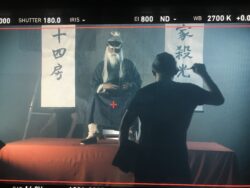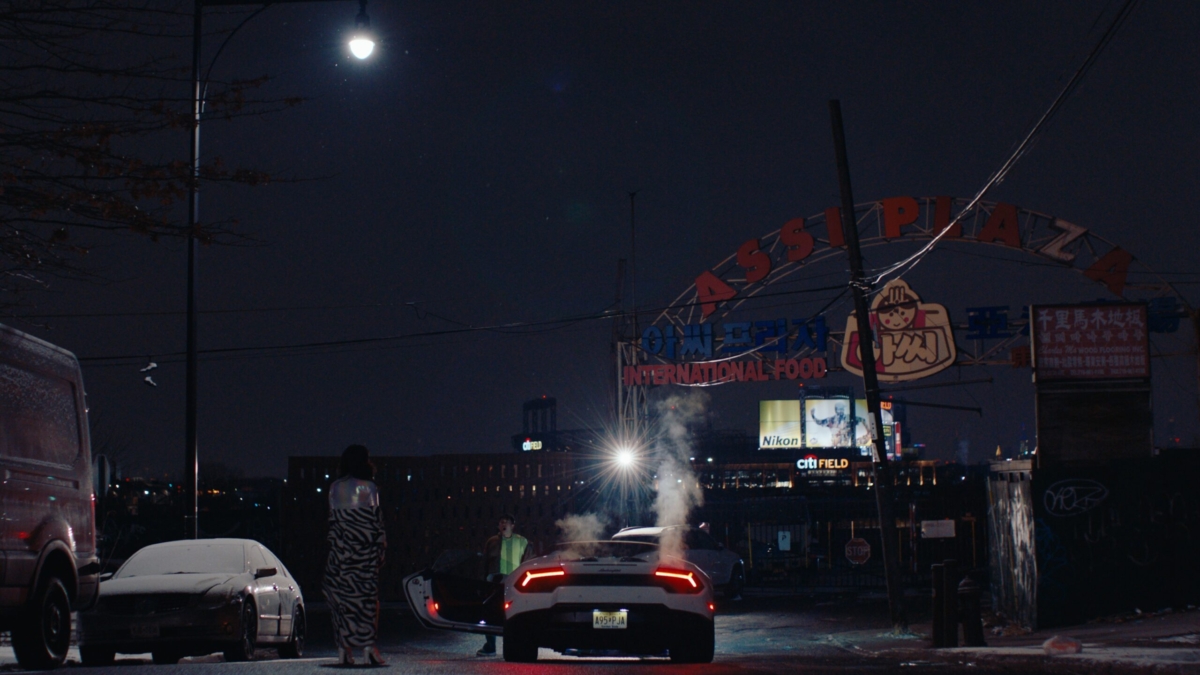The rumbling of a passing F train. The chatter and footsteps along Canal Street. The sizzle when oil hits the wok. This is the everyday music of New York City, and these filmmakers have a song to sing about each borough.

BAYARD STREET
Watched by: Jacqueline Grogran
Unlike what the opening title card reads, the two lovers of Cindy Chu’s “Bayard Street” – a film dedicated to Chu’s parents – do not meet at sea in the darkness of night but somewhere more familiar: a Chinese restaurant. Chu uses this frequented setting to tell the story of its overlooked custodians: Chinese immigrants, namely Mei Ching (Genevieve Shi), who in this 1980s Chinatown tale struggles to adapt to the bustle and clashes with her coworkers. When Ching’s manager berates her in front of customers, fellow coworker, Andy (Haosong Yang), stands up for her. This doesn’t stop Mei from quitting and storming off.
Cold, alone, freshly unemployed, and waiting for a bus that just left, Mei dwells on her decision to leave her comfortable life in China to move to the States. She doesn’t dwell for long when Andy soon appears with a jacket to offer. Killing time before her next bus, the two head to a nearby bar, where they exchange American dreams and recount their past lives back home.
The chemistry of these two Chinese immigrants, who on the surface couldn’t seem more different, crackles under the incandescence of Chinatown’s neon signage. Mei, running from her fate of becoming some stranger’s wife, shares her dream to continue bookkeeping, like she did for her family’s business. Even jaded Andy, doubtful that Americans would give office jobs to Chinese people, can’t deplete her moxie. When asked about his American dream, the waiter simply replies, “to make money and send it back to my mom” – a reality typical then for Chinese immigrant men, Chu explains, including her father. Andy keeps his real dream close to his chest, fastened with embarrassment, but charming Mei extracts it and meets it with enthusiasm.
The two stroll across the Manhattan Bridge and share a moment of romantic human connection I only dream about when I’m in the neighborhood, walking off dim sum or stumbling through after a disenchanting night out in LES. East is East, and West is West, and Bayard Street – as it turns out – is where the twain shall meet.

GOODBYE SAMMY
Watched by: Ren Hsieh
We like to think we can change. That we can fundamentally be better to ourselves and to the people around us, our loved ones, and strangers alike. But sometimes that change comes too late for the person who shared the worst of us. Which is where we find Sammy (Han Van Sciver) on a phone call asking for forgiveness and a cup of coffee from a lost love. But no matter how hard you want to remember only the good times – no matter how touching and cinematically these memories float in our mind’s montage – sometimes they just aren’t shared anymore. And reality is the cold voice of someone we once loved who just wants that call to end.

THE 44TH CHAMBER OF SHAOLIN (少林四十四房)
Watched by: Jacqueline Grogan
The Staten Island New Shaolin Temple promises their students – of which few remain – an authentic Chinese kung fu black belt in three months!!! Their method of achieving this, however, strays from the conventional path trodden by Mr. Miyagi and the like. Sifu Carlos Hernandez (Santino “Mario” Marin), listless owner of the failing kung fu school, trades the earnest and sage technique of “Wax on, Wax off” for “Tase nuts, Repeat” in this martial arts comedy with heart and hope: “The 44th Chamber of Shaolin,” written and directed by Jon Truei.
Yellowed newspaper clippings and trophies from decades past fill the sparsely attended school – the backyard of Hernandez’s Staten Island home – revealing his ambitious history of mastering the craft, as well as his loss of faith in the pursuit. Choosing this milieu was instrumental in telling what Jon describes as a “pandemic movie.” Coming out of the global lockdown, he didn’t want to make a film about headlines he saw amplified in the media already, so the filmmaker turned somewhere more personally familiar: failing martial arts schools. He had trained at several and was fascinated by “the last couple people who really, really care about a hobby where nobody’s coming anymore,” he explained, “and the kind of unusual characters that that attracts.” This rings true especially for hobbies that don’t offer “superficial or status-based reward,” Jon stressed, as those attract people whose love for the activity is “extremely pure.”
So, when a kid (Marshieh Johnson) from the nearby school comes knocking with only a fistful of singles, Sifu Carlos uses the opportunity to entertain himself in his languishing by taking advantage of the bullied high schooler’s desperation and youthful gullibility. Cue “Tase nuts, Repeat.” Beyond the undeniable humor and playful antics, both teacher and student ultimately learn a valuable lesson in the pursuit of a passion.
HEPTAPUS
Watched by: Demi Guo
In this Brooklyn film as grainy as the beach it’s shot on, an absurdist dramedy emerges. A boxer (Robert Lee Leng) loses his beloved dog, Princess Diana, to the eponymous tentacled threat during a stroll along the Coney Island beach, and grieves for her in the aftermath.
But the film isn’t a difficult watch – the grainy quality of the film is nostalgic, and the shots of everyday life give the impression that the viewer is safe in this timeless story of Brooklyn, where the vet’s office and apartment rooftop haven’t been caught up in the constant change in New York. It offers comfort through cringe comedy – the monotone and awkward ways people react to Leng’s character, not knowing how to interact with someone who grieves so loudly.
And besides – the dog does die in this film, but in the end, she may be the biggest character of them all.
SUCKER
Watched by: Demi Guo
Director Deni Cheng’s frustration bubbled over at the height of the COVID-19 pandemic, when the Chinese enclaves of New York City became an afterthought for any economic or government aid. What she created in “Sucker” is a searing critique of gentrification in Flushing, Queens – from the eyes of its own people.
In a formulaic story that breaks down what gentrification looks like in this particular Chinese American neighborhood, Cheng creates a protagonist who could be anyone in Flushing – Andy (Rob Chen), who faces rising rent prices, developers buying up property in the neighborhood, and the persistent presence of everyday crime in Flushing, as he raises his younger brother, Tom Tom (Logan Cheng).
In this character-driven narrative, we meet archetypes of the kinds of people who walk through Flushing society: The developers, the criminals, the out-of-touch rich, the working-class everyman who believes every developer’s bluff that selling their property would ‘create more opportunities’ … and the working-class everyman who powerlessly protests these changes, which is Andy himself. It’s a wry critique of the fact that Flushing is the second-fastest developing neighborhood in New York City – meaning that the dazzling Asian commercial district it has become is built off the backs of working-class residents.
Ultimately, Andy may be powerless in the inequitable scene that his home has become, but that doesn’t mean he’ll disappear from the narrative: He will continue to take up space and exist how he wants, and stand up for the future of his home, which exists in his little brother. And that is the space where many in Flushing will continue to exist despite the odds.

A LOVE SUPREME
Watched by: Ren Hsieh
An ode to the mighty John Coltrane, this quirky short invokes the seminal “A Love Supreme,” Coltrane’s own ode to the almighty. What that is or might be is to each and our own, but here the almighty is music. It is humor, love, and understanding. We find Eugene (Bud Tremblay), a punk, raging in Korean on the New York City streets below until he is faced with a rebuttal: “A Love Supreme” played over and over on a saxophone from across the way. And he can only hold out so long before he is compelled to change his tune, whip out a karaoke mic, and add a verse of his own.
JARED AND DAUGHTER
Watched by: Ren Hsieh
What begins as an absurdist take on the competitive business of perhaps self-fabricated artisanal craftsmanship, “Jared and Daughter” languidly reveals its central theme: the relationship of an aging father (Vincent Chan) and his adult daughter (Kim Wuan) who is outgrowing him. In this world, “table wiping” is a skill of the highest order meant for the bourgeoisie and their dinner parties – not to be confused with “table cleaning,” lest one wants to be firmly corrected. In a New York City riddled with tables covered in chalk drawings of cats that need to be skillfully wiped, Jared is no longer up to the task. The world is moving on without him and in the depths of his despair, he must learn to support his daughter’s independence and live in a world in which he no longer wipes.
“New York Rhapsodies” screened at the 46th Asian American International Film Festival.

